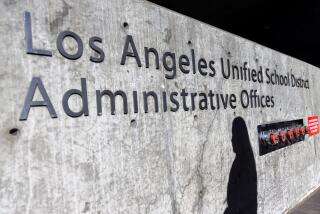Court Limits Liability of Schools in Sex Assaults
- Share via
SAN FRANCISCO — The state Supreme Court, limiting the liability of schools for misconduct by employees, held Thursday that a school district may not be sued for the alleged sexual assault by a teacher on a 14-year-old boy.
In a 5-2 decision, the justices ruled that while the district could be held liable for direct negligence in hiring or supervising a teacher, it was not responsible for acts that were a clear departure from his official duties.
The employee’s personal actions were not related closely enough to his authority as a teacher to warrant holding the district legally responsible, the court concluded.
“To impose, in effect, strict liability in this context would be far too likely to deter districts from encouraging, or even authorizing, extracurricular and/or one-on-one contacts between teachers and students,” retired Justice John A. Arguelles, participating by special assignment, said in the court’s lead opinion.
The threat of such liability would also inspire rigorous controls on activities that would “negatively affect” the educational process, and it would make already scarce insurance even more difficult for financially pressed schools to obtain, Arguelles said.
The ruling was a victory for school administrators and districts throughout the state that had supported the Oakland Unified School District in seeking reversal of an appellate court decision upholding a suit by the parents of a boy identified only as John R.
Attorneys for the parents had argued that the district should be liable for damages when an employee improperly uses his job-created authority against his victim.
The district countered that such liability would be financially “devastating” on schools. The Assn. of California School Administrators, backing the district, added that it was illogical and unfair to punish the district while allowing the allegedly guilty party to escape economic loss.
A separate civil suit by the parents against the teacher is pending, but criminal charges brought earlier against the instructor have been dismissed, according to lawyers in the case.
Margaret E. O’Donnell of San Francisco, attorney for the school administrators’ association, said the ruling brought “good tidings” for California schools.
“We have always agreed that if there is negligence, such as failing to properly screen employees, there should be liability,” O’Donnell said. “But a broad ruling on indirect liability as well would not be good public policy.”
The case arose in 1981 when John R., then a ninth-grader at a junior high school in Oakland, was asked by his mathematics teacher to take part in the school’s “work-experience” program, in which students help instructors grade papers.
According to the parents, the teacher intimidated the boy into committing sexual acts with him, threatening to give the youth failing grades if he did not comply. The boy later told his parents about the incidents. The parents notified district officials, who informed police.
The parents subsequently brought suit against the district, charging that it was directly liable for its negligence in failing to supervise the teacher and “vicariously” or indirectly liable for the teacher’s actions against their son.
The high court’s ruling on the issue of indirect liability came in a lead opinion by Arguelles, joined by Justice Allen E. Broussard, and a separate concurring opinion by Justice David N. Eagleson, joined by Chief Justice Malcolm M. Lucas and Justice Edward A. Panelli. Justices Stanley Mosk and Marcus M. Kaufman issued separate dissents.
Arguelles noted that employers were not liable when an employee “substantially departs” from his duties “for purely personal reasons” but acknowledged that there were instances where liability had been upheld. In one ruling by a state Court of Appeal, Orange County was found indirectly liable for a deputy sheriff’s threats to rape a woman motorist.
But the justices rejected the contention that the authority given a teacher over a student was tantamount to the power of police over the community. “The authority of a police officer over a motorist--bolstered most immediately by his uniform, badge and firearm, and only slightly less so by the prospect of criminal sanctions for disobedience--plainly surpasses that of a teacher over a student,” Arguelles wrote.
In dissent, Kaufman, while agreeing it was a “rare case” in which indirect liability would be warranted, said “this is such a case.” Under the circumstances, he said, “it is unjust not to require that the district share in the liability for the injuries which resulted.”
The district sanctioned the work-experience program in the teacher’s home and did not require that other students or adults be present, he noted.
“In effect, the district-sanctioned program virtually guaranteed that the teacher could act with impunity, free from fear of interruption or discovery, fully assured of complete privacy and secrecy,” Kaufman wrote. “Under these circumstances, it is not so unusual or startling that a teacher might seize the opportunity created by the program to make improper sexual advances toward one of his students.”
More to Read
Sign up for Essential California
The most important California stories and recommendations in your inbox every morning.
You may occasionally receive promotional content from the Los Angeles Times.










